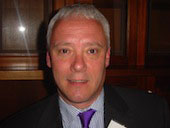|
Introduction to the writings of David Zigmond

Professor André Tylee
Soon after I had agreed to read David Zigmond's portfolio of papers, I received a bundle of them carefully bound
together, and dating from 1976. The earliest were fading and tethered with the same 'green tags' I used with my
Lloyd George files 20 years ago. The bundle opened with a cheery message written in a greetings card, which had
a photograph of a solitary black sheep amongst a flock of dozens, looking straight into my eyes with an expectant
stare. Initially perusing the writings I nostalgically recognised several of the papers from the early 1980s: my
earliest years as a GP and researcher into mental health in primary care.
The older articles I recalled were those exploring psychotherapy relevant to medical practice, papers advocating
a wider range of engagement skills in everyday consultations, and those on the 'Wounded Healer'.
All these years later I find myself bathing and revelling in his subsequent articles. Very few of the research
papers I read now are warmed or enlightened by human narrative. I highly recommend you read and ponder the brilliantly
articulate and engagingly written vignettes of 'Edward, 'Gladys', 'Carol' and the many others who vividly spring
to life, and remind us of what can be achieved when we ignore the computer, and instead listen to people's personal
communications … before reverting to 'protocol' or 'algorithm' mode! Both types of activity have their place, and
these are searchingly defined. Also highlighted is the absurd nature of some contemporary requirements; for example,
checking the height of a fit man in his 80s, and the remarkable effect such compliance had on a particular patient.
I won't here spoil this for the reader.
Am I overly optimistic? I like to believe that practitioners can learn to 'bob and weave' between styles, despite
the demands in today's NHS. Zigmond, though, dissects and defines the growing traps and obstacles which often impoverish
our contact-repertoire:
1. Industrialisation and mass production. How do we remain mindful and respectful of individual
variation?
2. 'A(na)tomisation'. Relentless fragmentation into more numerous, more narrowly focused specialties. How can we
then see whole people and their matrices?
3. Dependence on IT/informatics, where free thought is impeded and communication swamped by 'data'.
4. Over-adherence to care-pathways and symptom-lists, neglecting personal meaning (sometimes as a means to 'pass
the buck' (patient)).
5. Goals, targets, regulations, procedures and other 'measurables' popular with commissioners. Excesses of these
leading to practice becoming institutionally defensive, rather than humanly responsive.
Very little of the above seemed a threat when I went into practice in 1980. Many will argue for
the current benefits, and that it is impossible to turn back the clock. Many will also say that although, historically,
we have learnt the art (and science) of medicine by the use of narrative, it is now increasingly possible to get
good outcomes by focusing mainly on symptom clusters, with little investment in personal understanding. I believe
it's a 'both and' situation rather than an 'either or', so the art of personal understanding needs to be kept alive
and valued. These writings are enlivening and timely caveats, and reminders of the consequences of ignoring these.
The best care pathways, guidelines etc must always be informed by personal understanding, as much as the generic
evidence base. As highlighted so well in these articles, there is art in listening to, and understanding, what
may not be immediately apparent. We need such skills to humanely navigate our lifetime's professional development.
This is particularly so as training periods shorten.
Well-intentioned 'progress' often has unintended consequences. His
descriptions detail this; for example, how decentralisation of teams
into the 'community' may not lead to the better communication intended.
The following wide-ranging papers and essays sample the evolving work of a lifetime. Zigmond is an unusually thoughtful,
articulate and passionate advocate of psychology of resonance, imagination and dialogue. He shows how these may
grow in and between a practitioner and his patients. He does not eschew those guidelines and governances which
offer evident pragmatic sense, but reminds us that we must often balance quantifiable objectivity and management
with personal engagement and imagination: a kind of art. It is often through creative compromises and syntheses
that we achieve most.
This 'black sheep', David Zigmond, has three bags full of wisdom to offer; I hope you gain as much from his writings
as I.
Professor André Tylee
Department of Primary Care Mental Health
Institute of Psychiatry, London
December 2010
Contents Copyright ©; André Tylee 2010
Interested?
Many articles exploring similar themes are available via David Zigmond’s home page on www.marco-learningsystems.com
David Zigmond would be pleased to receive your
FEEDBACK
Version: 16th July 2017
|
